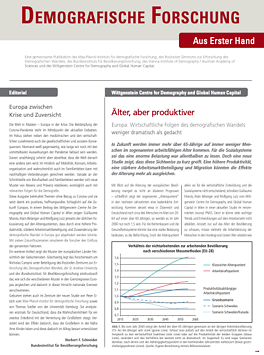June 30, 2020 | Defo News
Economic Aftermath of Demographic Change Could be Less Dramatic

© MPIDR
The new issue (No. 2/2020) of Demografische Forschung Aus Erster Hand, the popular science newsletter with latest research results from demography, has been released.
The Newsletter is available in German only.
"Demografische Forschung Aus Erster Hand" is a joint publication of the Max Planck Institute for demographic Research (MPIDR), the Rostocker Zentrum zur Erforschung des Demografischen Wandels (RZ), the Vienna Institute of Demography (VID), the Wittgenstein Centre for Demography and Global Human Capital and the Federal Institute for Population Research (BiB).
The topics of the new issue are:
1. Older, but More Productive
Europe: Economic aftermath of demographic change less dramatic than expected
(from Wittgenstein Centre for Demography and Global Human Capital)
In the future, there will be more and more people over the age of 65, while the so-called working age population gets smaller and smaller. Previously, this was thought to be an enormous burden for social security systems. That is, until now. A new study shows that this perspective is not enough to capture the whole picture. Higher productivity, greater labor market participation, and migration could compensate for the ageing process.
2. Regional Birth Rates in Europe
Although fertility rates vary widely across Europe, they are often comparable at border regions
(from Rostocker Zentrum zur Erforschung des Demografischen Wandels)
Europe is divided when it comes to fertility: While a relatively large number of children are born in the northwestern part of the continent, the birth rates in southern and eastern Europe, as well as in German-speaking countries are comparatively low. A new study now takes a closer look – examining how fertility is developing in over 1000 European regions and showing that border regions often have similar birth rates.
3. Retirement and Grandchildren: A Packaged Deal
Notably, the probability of having a second grandchild increases with retirement
(from Max Planck Institute for Demographic Research)
With plenty of time on their hands, grandparents can be quite a blessing for young families. It is therefore not surprising that the probability of gaining a(nother) grandchild after retirement increases. A new study now shows that this effect occurs especially when grandfathers retire and when there is already a first grandchild. However, the total number of grandchildren is not affected by retirement.
The newsletter is released four times a year and is available electronically and as a printed version and is free of charge.
All past issues are available online on the Newsletter website. On the website you also have the possibility to subscribe to the Newsletter to get informed about the release of the new issues or to receive the printed versions by mail.